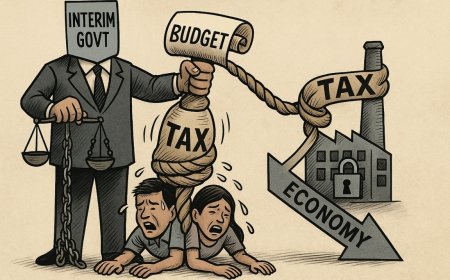Yunus in Beijing: Shaping a New Geopolitical Landscape in South Asia
Will the commitments made in Beijing lead to tangible benefits for ordinary Bangladeshis? Can the interim government navigate global rivalries without straining crucial alliances? Most importantly, will this diplomatic shift persist beyond the present political climate?

Yunus in Beijing: A New Geopolitical Shift in South Asia
When Nobel laureate Muhammad Yunus arrived in Beijing on March 27, his visit was more than a diplomatic engagement—it was a strategic move reshaping South Asia’s geopolitical landscape.
As Bangladesh’s interim chief advisor, Yunus’s four-day state visit to China coincided with Bangladesh’s Independence Day and the 50th anniversary of diplomatic relations between Dhaka and Beijing. However, beyond the symbolism, the agreements signed during the trip indicate a deliberate shift in foreign policy—one with implications extending from New Delhi to Washington.
On March 28, Bangladesh and China signed nine agreements covering economic cooperation, cultural exchange, and infrastructure development. Among the most significant were plans to modernize Mongla Port and establish a new industrial zone—projects closely aligned with China’s Belt and Road Initiative.
While the immediate focus is on economic benefits, the broader implication is clear: Bangladesh is asserting its independence in an increasingly polarized Indo-Pacific region.
For years—particularly during Sheikh Hasina’s 15-year tenure—Bangladesh maintained a close alignment with India, often at the cost of its own national interests. Geographic and historical ties made this orientation seem pragmatic, yet the outcomes have been largely skewed in India’s favor: unresolved water-sharing disputes, trade imbalances, cross-border killings by the Indian Border Security Force (BSF), and a lack of reciprocity.
Yunus’s Beijing visit marks a departure from this pattern, signaling Bangladesh’s willingness to diversify partnerships, even at the risk of disrupting traditional expectations in New Delhi. The economic benefits are immediate, with the Mongla Port modernization and industrial zone projects promising job creation, increased investment, and furthering Bangladesh’s ambitions as a regional manufacturing hub.
Additionally, the eight memorandums of understanding (MoUs) signed—covering areas such as translation, sports, media, and healthcare—indicate a strategic effort to deepen cultural ties and foster long-term engagement.
However, such diversification comes with challenges. Many nations expanding ties with China have faced economic and political complexities. To safeguard its autonomy, Bangladesh must ensure transparency, sustainability, and a balanced approach in its dealings.
India, closely observing these developments, has reason for concern. Yunus’s visit follows a period of noticeable diplomatic tension. Reports suggest that New Delhi declined multiple requests from Dhaka for a bilateral meeting between Muhammad Yunus and Indian Prime Minister Narendra Modi—a move widely interpreted as a diplomatic rebuff.
This refusal comes amid broader tensions, including India’s decision to grant asylum to former Prime Minister Sheikh Hasina, who has faced accusations of human rights violations. Additionally, state-sponsored disinformation campaigns originating from India have sought to undermine Bangladesh’s interim government through misleading narratives in national and international media. These developments have strained what was once a historically close relationship.
For India, China’s increasing influence in Bangladesh is not just an economic matter—it is a strategic one. Projects like the Teesta River initiative and Mongla Port modernization bring Beijing closer to India’s sensitive northeastern border. Furthermore, expanding cultural and potential military cooperation could diminish India’s traditional stronghold in Dhaka. If New Delhi fails to address issues like water-sharing, trade imbalances, and border security, it risks losing ground in a region it has long considered within its sphere of influence.
The United States, too, is watching closely. As Washington strengthens its Indo-Pacific strategy to counter China’s growing presence, Bangladesh’s strategic position at the Bay of Bengal takes on greater significance. While the US has extended economic aid and explored defense cooperation, its engagement may need to be more robust if Bangladesh continues deepening ties with Beijing. Key issues like the Rohingya crisis, maritime security, and trade could become focal points in this shifting geopolitical contest.
Perhaps most notably, this visit redefines perceptions of Yunus himself. Known globally as a humanitarian rather than a political strategist, his diplomatic approach in Beijing suggests a broader vision—one positioning Bangladesh as an assertive, non-aligned player capable of navigating major power rivalries in pursuit of national interests. The cultural MoUs, often overlooked in political analysis, underscore an investment in soft power and people-to-people ties that could shape regional dynamics for years to come.
To be clear, Bangladesh is not severing its ties with India or the West. Instead, it is adopting a pragmatic strategy—hedging its bets in an increasingly fluid global order. By signaling its intent to chart an independent foreign policy, Dhaka is adapting to shifting global power centers and recalibrating its diplomatic priorities.
The real test lies ahead. Will the commitments made in Beijing lead to tangible benefits for ordinary Bangladeshis? Can the interim government balance global interests without jeopardizing key alliances? Most crucially, will this strategic shift endure beyond the current political climate?
One thing is certain: Yunus’s visit to China marks more than a milestone in bilateral relations. It is a bold statement that South Asia’s geopolitical equations are evolving—and Bangladesh is ready to play a more independent role on the global stage.
What's Your Reaction?





















































































